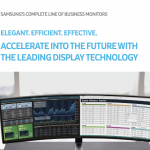AdcommTV Briefing
SMART BUILDINGS and the Future of Work
Emerging technologies such as the Internet of Things (loT), Big Data, and Intelligent Building Management Systems (iBMS) are fundamentally changing how modern buildings are designed, built, and operated. Enter the smart building. Smart buildings are those that utilize cutting-edge technology to enhance the experience of occupants, sustain optimal levels of performance, and reduce the costs of building operations. In a smart building, different technology systems work together to make the building highly efficient, flexible and a more attractive and desirable place to work.
While occupiers and developers of commercial real estate are increasingly aware of smart buildings, understandings, and definitions of the different aspects of building intelligence differ widely. This report sets out a new, outcome-orientated model for assessing how smart a building truly is.
Assessing Building Intelligence
Insightful. Smart buildings provide actionable insights into how a building is operating. In a smart building, real-time data is reported and used to inform decisions on building operations. Portfolio managers can see their operations across the globe and compare performance, giving them actionable insight on how to drive efficiencies and improvements.
Sustainable. Smart buildings enable facilities managers to easily monitor and control the performance of the buildings against their sustainability strategies. Combined with appropriate supply and demand energy management strategies, many smart buildings are even net-positive, creating more energy than they consume.
Flexible. Smart buildings are better able to accommodate agile, dynamic models of work, such as activity-based working, by allowing spaces to be easily re-configured. This enables the workplace to adapt to technological advances and changing business requirements more easily.
Experiential. Office users have greater control over their environment in a smart building, allowing them to tailor comfort levels to their personal preferences.
Healthy. Smart buildings contribute to a healthy environment and provide technology that can facilitate and measure wellbeing, helping to reduce the costs of sickness and absenteeism.
Productive. Smart buildings facilitate better, more efficient use of space and environments that enable companies to get more out of their staff.
Collaborative. Through advanced use of data and analytics, smart buildings are able to encourage interactions, knowledge sharing, and improve business performance.
Effective. Smart buildings meet the needs of their stakeholders and transform a company’s real estate into an enabler of business growth.
Delivering a Smart Building in 7 Stages
- Choose smart from the start. Smart buildings with the best outcomes are born from conception. Although not impossible, introducing smart after a building’s strategic development stage can incur more costs than needed, delay projects, and reduce the benefits for all stakeholders.
- Procure smart and challenge the state as quo. Identify experts that can help sell your concept to key stakeholders and work with your consultants to drive smart choices of technology, gain cost certainty, and keep your chosen solutions on track.
- Don’t forget the basics. Power demand and supply, an iBMS, and resilient building systems that interconnect can save time, manage risk, deliver cost efficiency, and lifecycle value. The most commercially attractive buildings are those where the lights do not go out and the systems are open to updating and improvement.
- Be as smart as your building needs to be. Focus on the technologies and base build inclusions that deliver tangible benefits for each building and deliver the concept of operation that is needed but allow for future innovation and improvement.
- Dealing with data. Focus on the data that is needed for reporting – efficiency, business improvement, and performance – and ensure that your technology partner or integrator is aligned to this.
- Don’t rule out your lifecycle. Understand the relationship between Cap-Ex and OpEx choices. Smart base build technology will open the door to smart facilities maintenance which can be far more cost-effective and drive ROI and system optimization at the most detailed level.
- Choose a strong smart partner. Partners that share and manage risk and reward equally, have clear experience in delivering smart, promote leading alliances with other technology players, and work regularly with the contractual chain in partnerships, are key.




